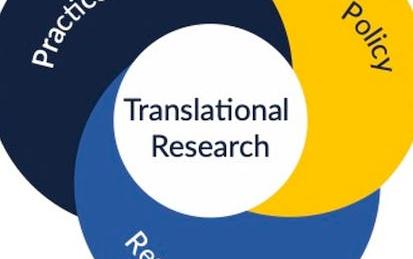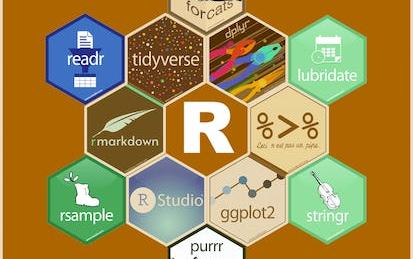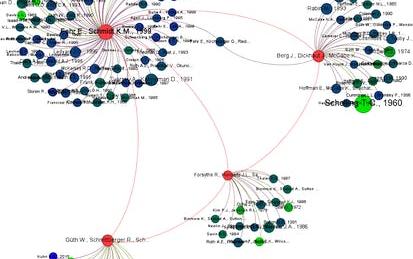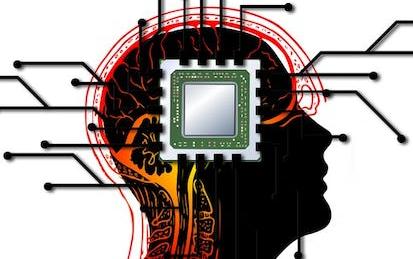

Our Courses

JavaScript Interview Challenges
Your essential tech interview preparation pack! Practice solving problems and honing the skills you need to succeed in a frontend coding interview.
-
Course by

-
 Self Paced
Self Paced
-
 3 hours
3 hours
-
 English
English

Neuroscience and Neuroimaging
This specialization combines the strength of 4 different neuroscience courses into a cohesive learning experience. Taught by Johns Hopkins University, it begins with fundamental neuroscience concepts for neuroimaging. Neuroimaging methods are used with increasing frequency in clinical practice and basic research.
-
Course by

-
 Self Paced
Self Paced
-
 English
English

Statistics with Python
This specialization is designed to teach learners beginning and intermediate concepts of statistical analysis using the Python programming language. Learners will learn where data come from, what types of data can be collected, study data design, data management, and how to effectively carry out data exploration and visualization. They will be able to utilize data for estimation and assessing theories, construct confidence intervals, interpret inferential results, and apply more advanced statistical modeling procedures.
-
Course by

-
 Self Paced
Self Paced
-
 English
English

Academic English: Writing
The skills taught in this Specialization will empower you to succeed in any college-level course or professional field. You’ll learn to conduct rigorous academic research and to express your ideas clearly in an academic format. In the final Capstone Project, all the knowledge that you’ve gained over the span of these courses will culminate into an academic research paper on an issue of your choice.
-
Course by

-
 Self Paced
Self Paced
-
 English
English

People and Soft Skills for Professional and Personal Success
Knowledge of soft skills or people Skills are increasingly coming into focus and being recognized as critical for success - hence at IBM we call them "Success Skills", and categorize them as "Hot Skills". A research by Harvard University, Carnegie Foundation and Stanford Research Center has concluded that 85% of job success comes from having well developed soft skills and people skills,and only 15% of job success comes from Technical skills and knowledge (hard skills). This specialization is aimed at helping you develop these powerful people and soft skills and behaviors that include: creat
-
Course by

-
 Self Paced
Self Paced
-
 English
English

Translational Science
An introduction to the field of Translational Science and its applications to improve patient and community health through the four stages of translational research. Translational science is the process of turning observations in the laboratory, clinic, and community into interventions that improve the health of individuals and populations. As the translational research enterprise — both in the United States and internationally — continues to expand, there is a growing need to increase the number of people pursuing training in the fields of clinical research and translational science.
-
Course by

-
 Self Paced
Self Paced
-
 English
English

Trading Strategies in Emerging Markets
This Specialization equips individual investors and money managers with the skills required to develop their own trading strategies and test them. When you complete the Specialization, you’ll be ready to apply eight ready-made trading strategies, based on rigorous academic research, that have been shown to be. You’ll also be able to design your own trading strategy, back test it, and measure its performance.
-
Course by

-
 Self Paced
Self Paced
-
 English
English

Blockchain Revolution
Blockchain is poised to transform every industry and managerial function—redefining the ways we transact online, share ideas, and manage workflows. It’s a new technology that every business professional needs to understand. This four-course Specialization introduces you to the world of blockchain technology—explaining what blockchain is, how it works, and why it’s revolutionary. You will learn about various categories of cryptoassets, and the ways they can be transacted on a blockchain.
-
Course by

-
 Self Paced
Self Paced
-
 English
English

Multiple Regression Analysis in Public Health
Biostatistics is the application of statistical reasoning to the life sciences, and it's the key to unlocking the data gathered by researchers and the evidence presented in the scientific public health literature. In this course, you'll extend simple regression to the prediction of a single outcome of interest on the basis of multiple variables. Along the way, you'll be introduced to a variety of methods, and you'll practice interpreting data and performing calculations on real data from published studies.
-
Course by

-
 Self Paced
Self Paced
-
 14 hours
14 hours
-
 English
English
Pricing Strategy Optimization
In this Specialization, we show you techniques to increase price realization and maximize profits. Learn from Boston Consulting Group's global pricing experts and University of Virginia Darden School of Business faculty, who share the frameworks, tips and tools we use in our business and research environments. We will look at pricing through BCG's proprietary and time-tested three “lenses”—cost and economics, customer value, and competition—to build your understanding of the strategic power of pricing.
-
Course by

-
 Self Paced
Self Paced
-
 English
English

Data Analysis and Interpretation
Learn SAS or Python programming, expand your knowledge of analytical methods and applications, and conduct original research to inform complex decisions. The Data Analysis and Interpretation Specialization takes you from data novice to data expert in just four project-based courses. You will apply basic data science tools, including data management and visualization, modeling, and machine learning using your choice of either SAS or Python, including pandas and Scikit-learn. Throughout the Specialization, you will analyze a research question of your choice and summarize your insights.
-
Course by

-
 Self Paced
Self Paced
-
 English
English

Global Disease Masterclass
The Global Disease Masterclass specialisation aims to provide students with an overview of core health challenges and lines of epidemiological research being undertaken, across a range of infectious and non-communicable diseases. The specialisation begins by examining the global distribution of diseases and the major trends that we have seen in the last several decades. Simultaneously, we consider the data that are used to construct such estimates. We then consider the role of social determinants and risk factors in shaping the distribution of disease in populations.
-
Course by

-
 Self Paced
Self Paced
-
 English
English

Expressway to Data Science: R Programming and Tidyverse
R is one of the most popular languages used in the data science community and essential for any aspiring data scientist. This specialization will teach you how to do data science in R whether you are a beginning or a seasoned programmer. You will begin this three-course specialization by reviewing the fundamentals of programming in R and the importance of creating reproducible research.
-
Course by

-
 Self Paced
Self Paced
-
 English
English

Advanced Clinical Data Science
This course prepares you to deal with advanced clinical data science topics and techniques including temporal and research quality analysis.
-
Course by

-
 Self Paced
Self Paced
-
 4 hours
4 hours
-
 English
English

Frozen in the Ice: Exploring the Arctic
Why would hundreds of scientists from around the world intentionally freeze a ship in Arctic sea ice for an entire year, braving subzero temperatures and months of polar darkness? This may sound like a fictional adventure movie plot, but from September 2019 through October 2020, the MOSAiC (Multidisciplinary drifting Observatory for the Study of Arctic Climate) Arctic research expedition did just this.
-
Course by

-
 Self Paced
Self Paced
-
 16 hours
16 hours
-
 English
English

Intellectual Humility: Science
It’s clear that the world needs more intellectual humility. But how do we develop this virtue? And why do so many people still end up so arrogant? Do our own biases hold us back from becoming as intellectually humble as we could be—and are there some biases that actually make us more likely to be humble? Which cognitive dispositions and personality traits give people an edge at being more intellectually humble - and are they stable from birth, learned habits, or something in between?
-
Course by

-
 Self Paced
Self Paced
-
 21 hours
21 hours
-
 English
English

Uncommon Sense Teaching: Teaching Online
In Uncommon Sense Teaching: TEACHING ONLINE we’d like to help you to move toward fresh approaches to online teaching that build on the latest insights from scientific research. We’ll use insights from movie-making—not to mention from odd visual tricks in Barb’s kitchen—to see how students learn, both independently and together. We all know, for example, that social learning is valuable in helping students grapple with tough concepts as well as in making learning more fun.
-
Course by

-
 Self Paced
Self Paced
-
 15 hours
15 hours
-
 English
English

Citation Analysis for Bibliometric Study
In this 2 hour long project, you will learn to search and extract relevant research articles and their linked references efficiently from a journal database to conduct a bibliometric literature review.
-
Course by

-
 Self Paced
Self Paced
-
 3 hours
3 hours
-
 English
English

Operational Research for Humanitarians
Evidence is central to good decision-making both in the humanitarian sector and beyond. Every day, a vast amount of evidence is generated that is relevant to humanitarian actors, much of it through research by academics and practitioners. This evidence can be incredibly valuable. It can help us better understand a situation and make humanitarian action more effective and accountable.
-
Course by

-
 Self Paced
Self Paced
-
 17 hours
17 hours
-
 English
English
SAS Visual Business Analytics
Using SAS Visual Analytics, you will learn to access and manipulate data, analyze data with a variety of interactive reports and graphics, and design and share dashboards to visualize your data. SAS Visual Analytics is a useful skill in a variety of careers, including business analyst, researcher, statistician, or data scientist. The Macquarie Business School at Macquarie University is proud to partner with global analytics leader SAS in offering SAS Certification as part of their Global MBA program.
-
Course by

-
 Self Paced
Self Paced
-
 English
English

Specialty Topics: Biology Across Disciplines
In this course, we will explore the applicability and relationship of biology to the arts, business, and psychology. First, we’ll discuss art as a foundational practice to biology and how biology as a science can explain how we interact with the arts, in particular, our experiences making and listening to music. Next, we will discuss the business of biology and how research is funded and the process of clinical trials and human subjects research.
-
Course by

-
 Self Paced
Self Paced
-
 12 hours
12 hours
-
 English
English

How to Write and Publish a Scientific Paper (Project-Centered Course)
What you will achieve: In this project-based course, you will outline a complete scientific paper, choose an appropriate journal to which you'll submit the finished paper for publication, and prepare a checklist that will allow you to independently judge whether your paper is ready to submit. What you'll need to get started: This course is designed for students who have previous experience with academic research - you should be eager to adapt our writing and publishing advice to an existing personal project.
-
Course by

-
 Self Paced
Self Paced
-
 13 hours
13 hours
-
 English
English

Mind and Machine
This specialization examines the ways in which our current understanding of human thinking is both illuminated and challenged by the evolving techniques and ideas of artificial intelligence and computer science. Our collective understanding of “minds” – both biological and computational – has been revolutionized over the past half-century by themes originating in fields like cognitive psychology, machine learning, neuroscience, evolutionary psychology, and game theory, among others.
-
Course by

-
 English
English

Career Planning: A Pathway to Employment
This course is designed to foster creative approaches to launching a new career. You will articulate best ways to make a first impression and analyze your strengths by creating a personal statement. You will identify appropriate elements to make your resume stand out from the crowd. You will also identify the most effective ways a cover letter can answer a job description, and how to best leverage social media in your job search. In short, this course will help you to prepare for a new job.
-
Course by

-
 Self Paced
Self Paced
-
 24 hours
24 hours
-
 English
English

Improving Your Statistical Questions
This course aims to help you to ask better statistical questions when performing empirical research. We will discuss how to design informative studies, both when your predictions are correct, as when your predictions are wrong. We will question norms, and reflect on how we can improve research practices to ask more interesting questions.
-
Course by

-
 Self Paced
Self Paced
-
 18 hours
18 hours
-
 English
English



